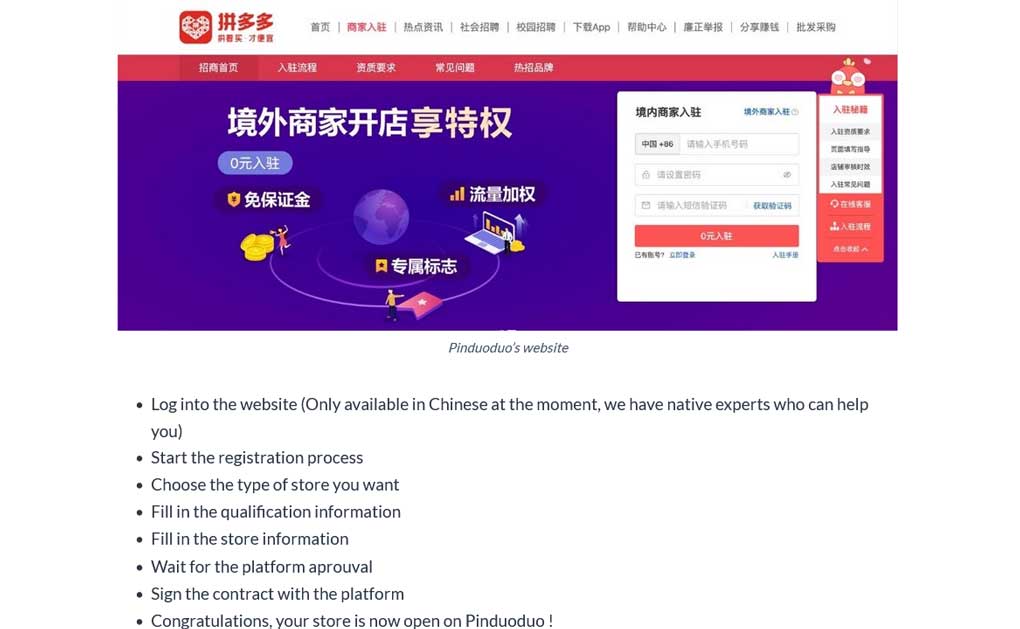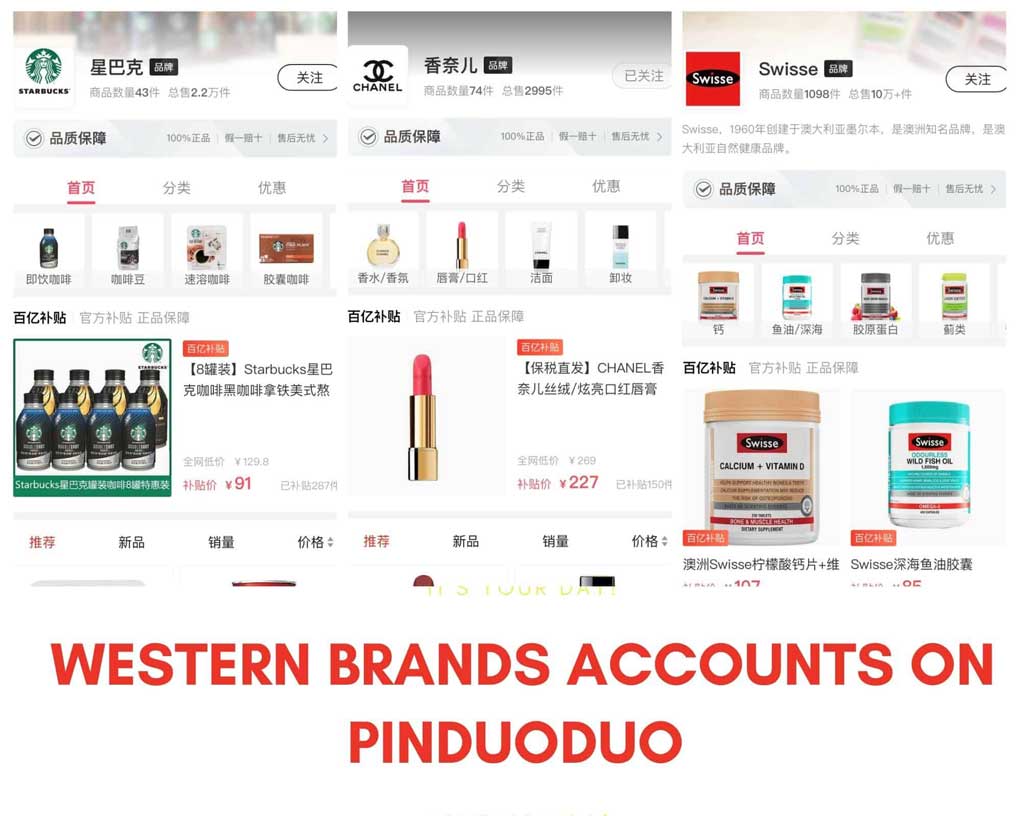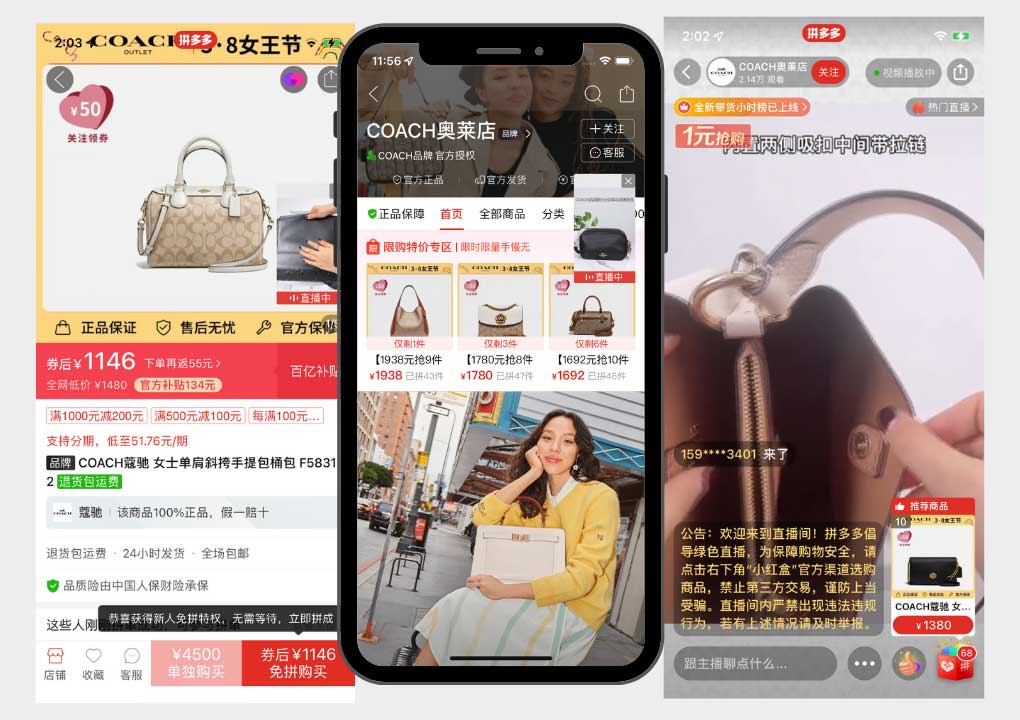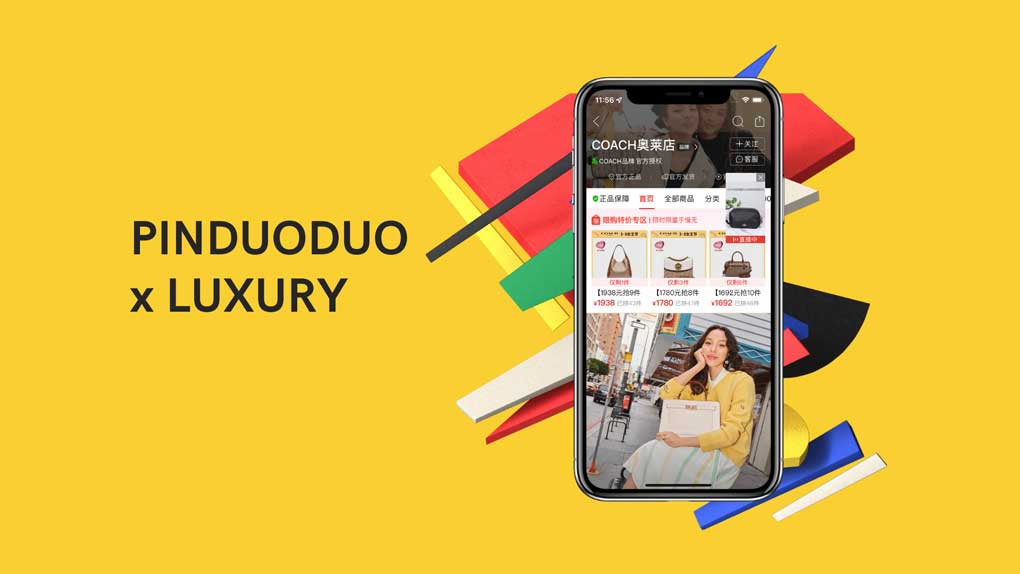You may think of Alibaba and JD.com as the only Chinese eCommerce platforms to set up shop with. However, there’s one other platform that you need to set your sights on if you want to reach as many people as possible. This is Pinduoduo.
You will often see Pinduoduo vs Alibaba comparisons largely because of their difference in experience but also their shopping model. PDD has been a major rival for Alibaba because of its exponential growth in the past few years despite its young age. Is it a good idea to sell luxury items on this platform? Let’s find out.

What Is Pinduoduo?
This low-cost eCommerce platform is currently the 3rd largest in China. This is despite its relatively young age compared to its established rivals Alibaba and JD.com.
But what makes Pinduoduo (PDD) so special that it is even projected to overtake eCommerce giants like Alibaba?

The main feature that stands out is the platform’s Group Buying feature. This allows users to buy their products at discounted rates if they’re able to get as many people as possible to buy the same item on the platform.
This new take on eCommerce, dubbed social shopping, proved to be its key to being catapulted as one of the top eCommerce destinations for many people. In fact, the difference in retail price between Pinduoduo eCommerce and its rivals makes it a viable option for many price-sensitive Chinese users.
The First Social eCommerce Platform in China
PDD takes the credit for being the first platform to integrate social media with online shopping. Partnering up with WeChat, PDD has leveraged the social media platform’s huge user base to quickly grow and connect with farmers, suppliers, and distributors across China.
While the West’s Groupon was the first to employ group buying, PDD’s approach is to let the buyers take initiative on what products they want to get a discount on. In contrast, Groupon’s merchants have tight control over which products get a discounted rate.
PDD is even designed to replicate the experience that you get as you sift through a bazaar or a mall, looking for a product. Unlike its rival Alibaba, PDD doesn’t have a search feature. Instead, it encourages users to scroll through its products, bringing thrill and excitement to the experience of finding the products they will love.
What Does It Offer Luxury Brands in China?
If PDD is a low-cost eCommerce platform, do you really have a space to sell on Pinduoduo as a luxury brand?
The simple answer to that question is yes. While there is a dissonance between PDD’s group buying feature and the perceived exclusivity of luxury brands, PDD is actually really valuable because of its unique shopping experience. Luxury brands can venture into releasing lower-value items in their lines to serve as their consumer’s entry point towards patronizing other products.
This is essential if you are looking to break the divide between consumer perception of luxury brands and price-sensitive users on the platform. By showing consumers that you are capable of being involved in their shopping experience through group buying, you are tapping into the demographics that PDD dominates, which are the 600 million+ users across lower-tiered cities.
Pinduoduo Social E-Commerce & Group Buying: An Opportunity for Luxury Brands
Selling on Pinduoduo presents luxury brands with a myriad of opportunities. While we said before that you are tapping into a large demographic of China’s eCommerce market, you still have to know this unique mode of eCommerce is viable for luxury brands.
- The first reason is the sheer virality of PDD items. Selling on Pinduoduo means that you are exposing your products to countless groups and communities that desire to buy luxury goods. This means that people will invite other users to go and check out your store in PDD and convince them to make the same purchase. This word-of-mouth marketing enhances your product image and connects you with as many people as possible.
- The whole process is made easier because of PDD’s integration with perennial social media platforms in China, such as WeChat and QQ. These two platforms allow its users to buy PDD products directly from their applications. This means that the process of transferring from one window to another is eliminated, thereby facilitating a frictionless transition between socializing and shopping.
- Group buying serves as an incentive for people to keep joining the platform and take advantage of the discounted rates. This means that many users will keep on advocating for PDD as long as there are items that they think would make a great purchase. This is the second opportunity presented by PDD’s platform.
- Its unique consumer-to-manufacturer (C2M) model allows merchants in the platform to derive insights into what products should be sold and produced.
A quick look at the top purchases on the platform will enable luxury brands to make an accurate prediction on what to sell there. The consumer-driven process also eliminates the need to pour a lot of money into investing in research and marketing initiatives.
Pinduoduo’s Cross-Border eCommerce
Of course, PDD is also eyeing to expand on more high-ticket items. This is the reason why we are seeing initiatives like Duoduo International. This currently invitation-only version of the platform allows merchants to set up four types of stores:
- A Hypermarket for merchants with many brands.
- An Authorized Seller
- A Flagship Store
- An Exclusive Seller
These stores can sell on Pinduoduo and take advantage of its discount schemes through group buying, coupons, and other incentives.
This presents a huge opportunity for many luxury brands that want to establish a presence inside one of China’s most successful eCommerce platforms.
Process of Opening a Pinduoduo Store
The process to set up shop and sell on Pinduoduo is quite easy.
Firstly, you have to go to PDD’s merchant sign-up page and sign up as a merchant under the cross-border category. You will then have to create an account. A passcode will be sent to your mobile number to verify your identity. Just input it on the page to verify. Log into your account and choose the category of your store.

You will then have to provide the following documentation:
- Proof of business such as a business license.
- ID of a legal representative of your brand.
- ID of your store manager.
- Trademarks, Authorization Letters, and other documents that qualify your brand.
- Proof of warehouse and other logistics partners.
After getting these documents, you will then have to pay as much as $7,600, depending on the industry that your brand is in. This deposit is refundable.
Submit your application and wait for a few days for a contract to be signed. This process is mostly done by your legal representatives.
After signing the contract, just wait until you’ve got your store set up on the platform and you’re good to go.
Luxury Brands That Opened a Pinduoduo Store
While Pinduoduo eCommerce started its journey by partnering with local merchants and farmers, its exponential growth has certainly attracted many luxury brands as well. This means that many brands see the potential of PDD in terms of reaching the “forgotten” buyers of the Chinese market which are the consumers that live in lower-tiered cities.

But what are these brands exactly and how did they utilize the platform to grow in China?
Heritage Brands in Shanghai
Many heritage brands in Shanghai benefited from the campaign by Pinduoduo eCommerce to sell their items on the platform. In fact, these brands experienced four times their sales after they opened a Pinduoduo store.
An Italian Multi-Brand Distributor
This distributor found growth in China after opening 4 flagship stores in Pinduoduo. They are selling well-known luxury brands such as Armani, Givenchy, and Swarovski, among others.
This pivot towards the Chinese eCommerce platform was driven by the lower sales experienced in Italy due to the pandemic. Seeing growth on the platform despite its price-conscious demographic shows that there is a potential market for luxury brands as well.
Daidaihao Jewellery
This Chinese flagship store is also proof that high-end product sellers can thrive on the platform. Daidaihao jewelry uses live streaming as its main marketing strategy to reach its audience. Because of Duoduo Live, the store was able to sell authentic jewelry to its consumers with little to spend in terms of marketing.
Seagull Watch
If you haven’t heard of this brand yet, then you should know that this company is responsible for about a quarter of the world’s mechanical watch movements.
Seagull Watch is one of the first companies that started to sell on Pinduoduo. As they opened a Pinduoduo store, they found a new generation of watch lovers inside the platform which helped them increase their sales and even exceed their sales expectations within the platform.
Of course, there are other luxury brands that are offered by various distributors and authorized sellers in Pinduoduo such as:
- Coach
- Sennheiser
- Air Jordans
- Sulwhasoo

These brands still continue to sell wildly despite PDD’s reputation as a low-cost eCommerce platform. Obviously, PDD has grown to be more than just a shopping platform for the price-conscious but also for higher-end buyers as well.
Should You Sell on Pinduoduo?
With a large user base and a unique shopping experience, it is hard to ignore that PDD is a viable platform to further expand in China. Luxury brands should definitely open a Pinduoduo store to take advantage of its large demographic.
Pinduoduo, for luxury brands, should not be used as the main sales channel but rather to sell old series/open outlet stores. This is a great way to get rid of stocks and grow awareness in areas of the countries where the economy is rapidly growing.

Looking at Pinduoduo as an option? Drop us a request and let’s have a chat!

